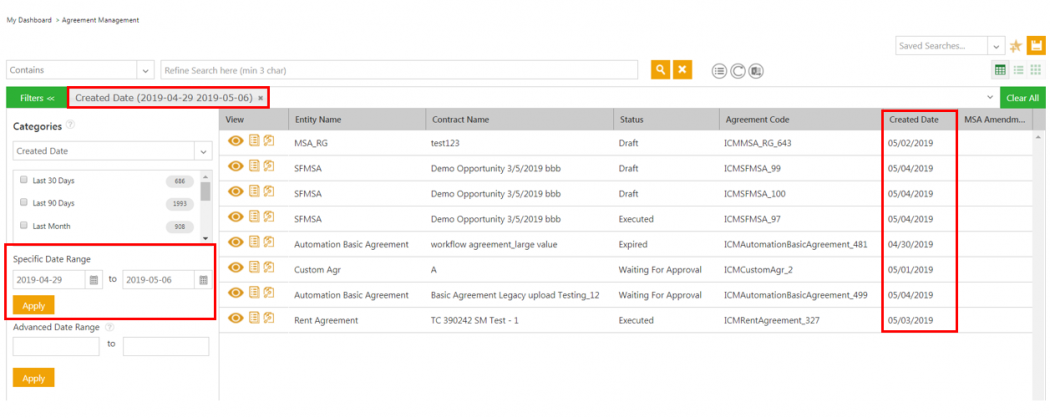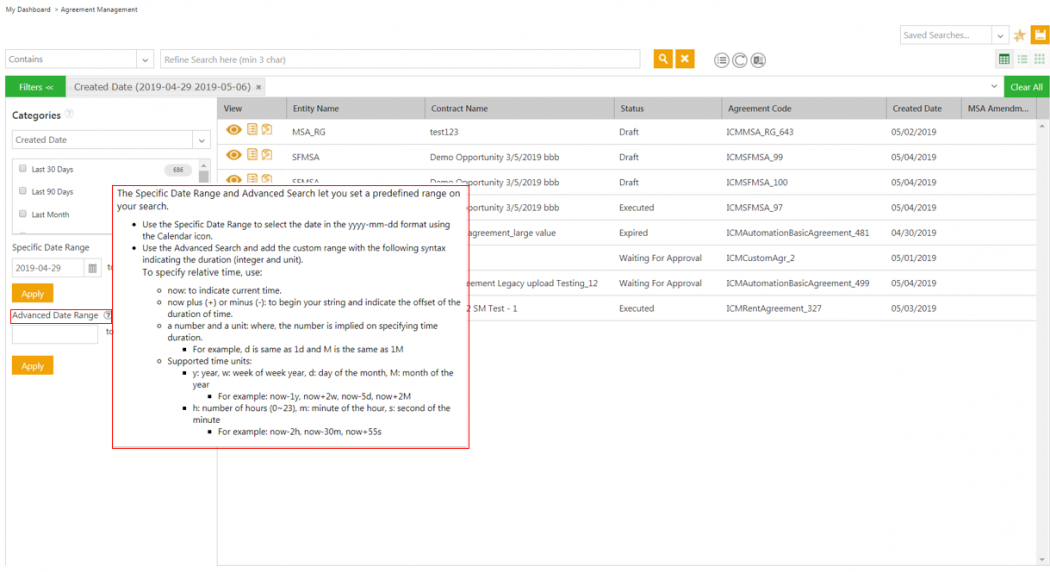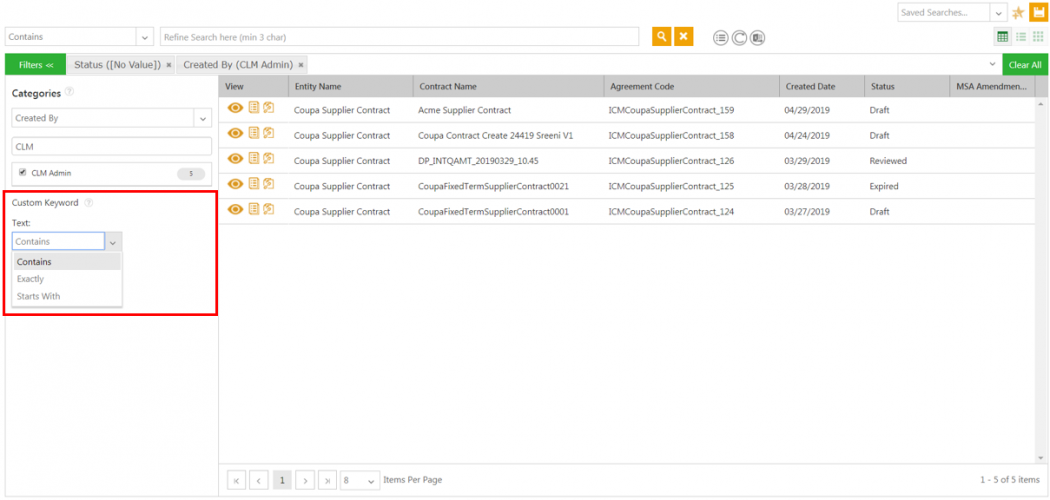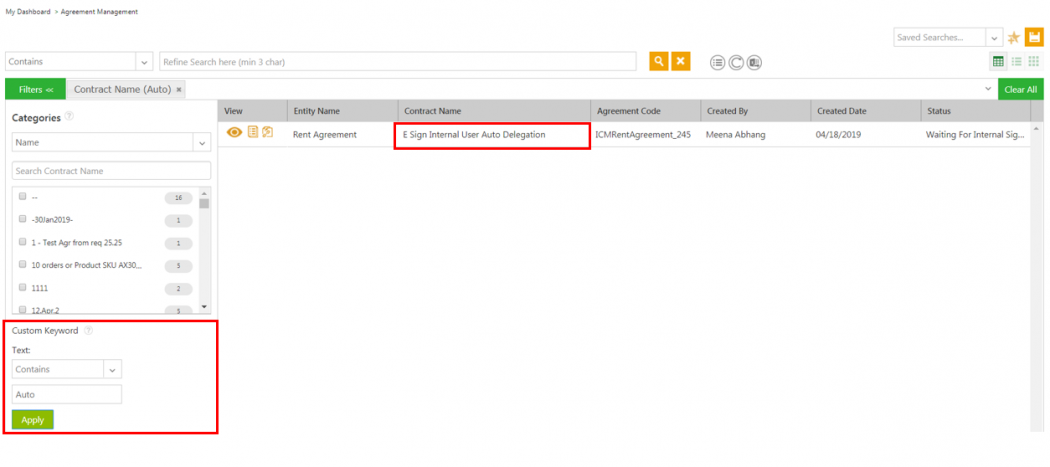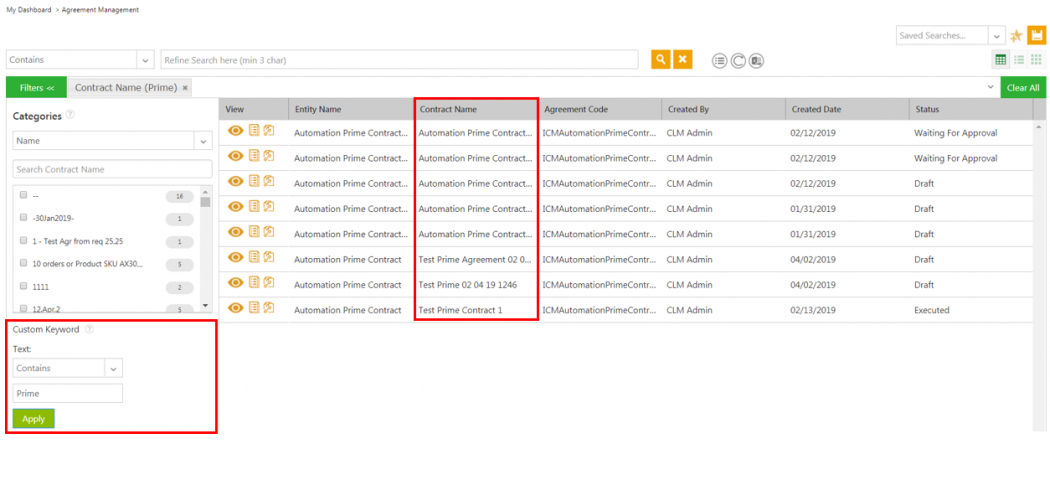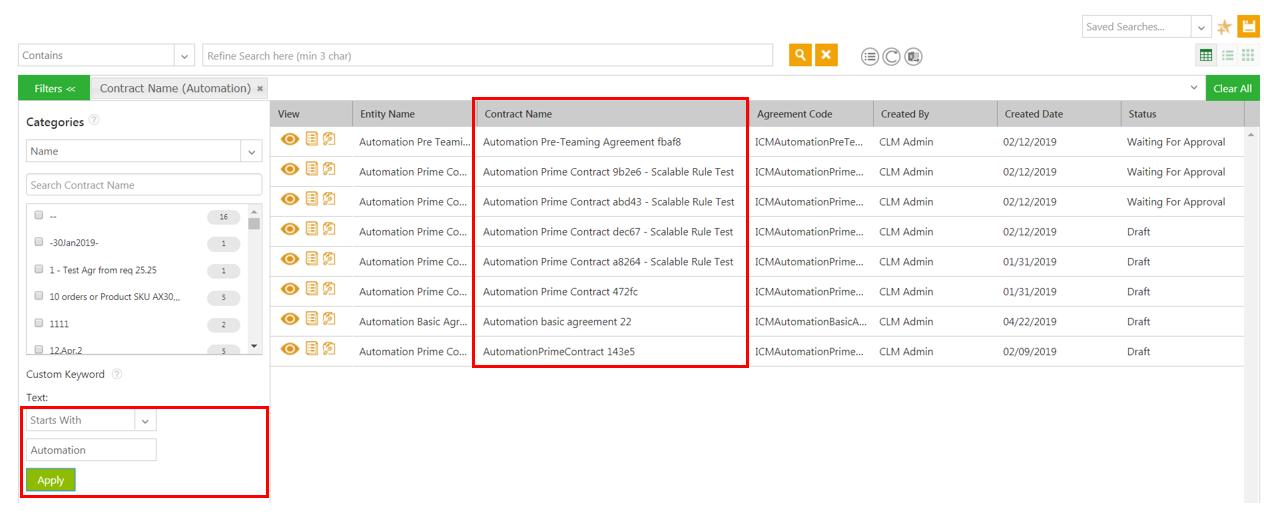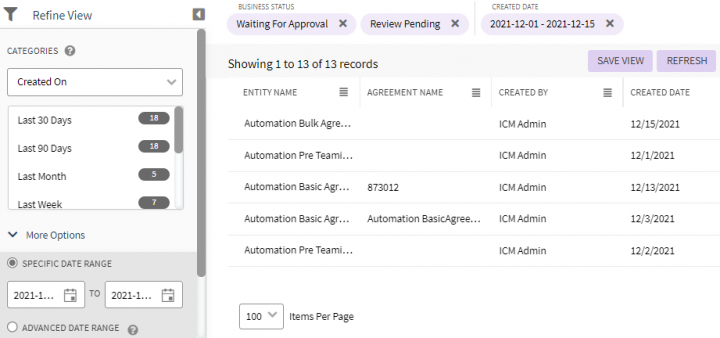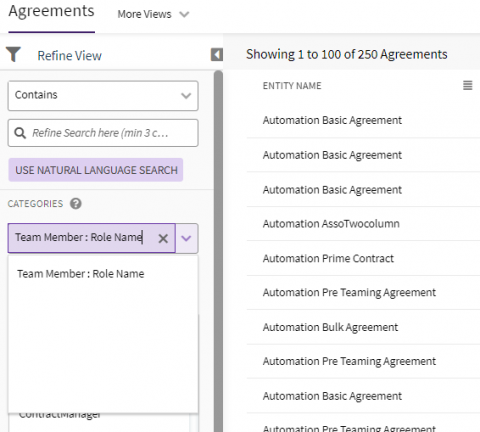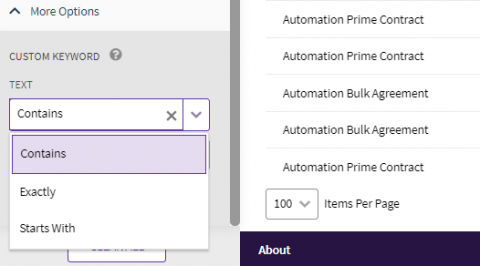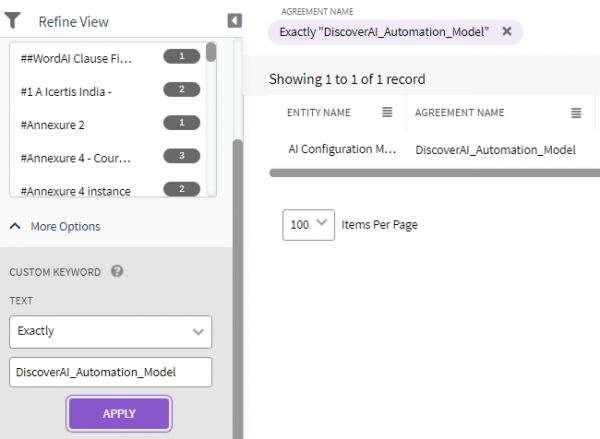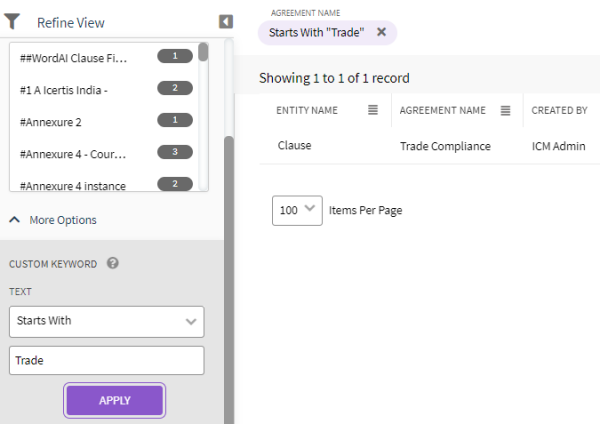| (16 intermediate revisions by 4 users not shown) | |||
| Line 9: | Line 9: | ||
*Make changes to it | *Make changes to it | ||
| − | The process for searching any entity (Agreements, Contract Types, Requests, Clauses, and so on) is identical. | + | The process for searching any entity (Agreements, Contract Types, Requests, Clauses, and so on) is identical. ICI provides the type ahead feature for search facets so that the results displayed are filtered while you are typing, thus enabling you to quickly arrive at the desired value. You can type in the text box between the search facet drop-down and the list of facet values, and ICI will display all the matching values which start with the typed content. The type ahead feature works as the "Contains" operator for the sake of consistency and ease-of-use. |
| − | This search is case-insensitive and | + | This search is case-insensitive and ICI displays all the values of the specified facet Attribute and not just the top 1000 values. You can filter the search facet values, select one or multiple of these by checking the relevant checkboxes, and then again select another facet attribute and continue the process to apply multiple facet filters. As soon as you select another facet attribute, the textbox is refreshed. This feature is applicable to the following data types – String, User, Auto, Email, and URL. It is enabled on all search pages, including Index pages, Advanced Search page, Lookup Search page, and so on. |
| − | <div class="image-green-border">[[File:Searching | + | <div class="image-green-border">[[File:Searching Agreements1.PNG|720px|Searching Agreements1.PNG]]</div> <div class="image-green-border"> </div> <div class="image-green-border">You can find a specific Agreement from the Agreements Page using any of the following searches:</div> |
*Free Text Search | *Free Text Search | ||
*Category Search | *Category Search | ||
| Line 20: | Line 20: | ||
== Free Text Search == | == Free Text Search == | ||
| − | The operators | + | The operators "Contains" and "Exactly" on all search pages in the horizontal Search bar help the users in easy and quick searching. The operator "Contains" is the existing functionality, whereas "Exactly" is a new operator. |
The operators in the horizontal search bar include: | The operators in the horizontal search bar include: | ||
| Line 26: | Line 26: | ||
1. '''Select '''the Entity to search. | 1. '''Select '''the Entity to search. | ||
| − | 2. '''Select''' any one operator to search by from the drop-down list. You must enter a minimum of 3 characters to search by. On searching using just one or two characters, | + | 2. '''Select''' any one operator to search by from the drop-down list. You must enter a minimum of 3 characters to search by. On searching using just one or two characters, ICI displays a validation message prompting you to enter at least 3 characters. These fields are case-insensitive, hence characters may be entered in upper and/or lower case. |
| − | <div class="image-green-border">[[File:Searching | + | <div class="image-green-border">[[File:Searching Agreements2.PNG|480px|Searching Agreements2.PNG]]</div> |
The following operators are available: | The following operators are available: | ||
| − | *Contains | + | *Contains: displays all the Agreements where the entered value appears anywhere in the free text search results. If you enter a string (multiple words), ICI considers the exact string including the spaces entered between these words. The functionality is the same as the existing one and you can perform a search using * or other wildcard search characters as well as the "AND", "OR" operators manually. The default behavior among the entered words will remain as "AND". |
| − | *Exactly | + | *Exactly: works the same way as "Contains" of the Custom Keyword search discussed above. The only difference is that "Exactly" in Free Text search searches for the exact match across Attributes of Agreements, user-defined Associations and system-defined Associations, whereas in Custom Keyword, it searches only in that specific Attribute. If you enter a string (multiple words), ICI considers the exact string including the spaces between these words. The functionality is the same as the existing one and you can perform a search using * or other wildcard search characters as well as the "AND", "OR" operators manually. The default behavior among the entered words will remain as "AND". |
<div class="note-box">'''Note: '''The above values are configurable as per your requirement in terms of names, their sequence in the dropdown, and their default value.</div> | <div class="note-box">'''Note: '''The above values are configurable as per your requirement in terms of names, their sequence in the dropdown, and their default value.</div> | ||
== Category Search == | == Category Search == | ||
| Line 37: | Line 37: | ||
To search for Requests using the Category drop-down list: | To search for Requests using the Category drop-down list: | ||
| − | 1. '''Click''' | + | 1. '''Click''' "Agreements" on the "Home" page. The agreement index page opens, which displays all the existing Agreements. |
| − | 2. | + | 2. '''Use '''the "Categories" drop-down list to filter the Agreements and find the exact match that you are looking for. For example, search by "Status", "Created By", "Date", and so on. All options that match the selected category are displayed. |
| − | 3. Select the desired criteria by selecting the boxes next to that option. Agreements that match these specified criteria are displayed. | + | 3. '''Select '''the desired criteria by selecting the boxes next to that option. Agreements that match these specified criteria are displayed. |
| − | <div class="image-green-border">[[File:Searching | + | <div class="image-green-border">[[File:Searching Agreements3.PNG|720px|Searching Agreements3.PNG]]</div> |
| − | 4. Filter your search further by typing specific keywords in the | + | 4. '''Filter '''your search further by typing specific keywords in the "Custom Keyword" field and then '''click''' "Apply". You can use Boolean operators such as And/Or or search by wildcards to filter the results. For example: |
<ul style="margin-left: 80px;"> | <ul style="margin-left: 80px;"> | ||
<li>APP* - displays agreements only in the APPROVED and WAITING FOR APPROVAL states</li> | <li>APP* - displays agreements only in the APPROVED and WAITING FOR APPROVAL states</li> | ||
| Line 52: | Line 52: | ||
5. You can also type free text in the Refine Search Here... search box. A list of relevant agreements is displayed. | 5. You can also type free text in the Refine Search Here... search box. A list of relevant agreements is displayed. | ||
| − | The operators | + | The operators "Contains" and "Exactly" on the search pages in the horizontal search bar help the users in easy and quick searching. The operator "Contains" is the existing functionality, whereas "Exactly" is a new operator. |
The operators in the horizontal search bar include: | The operators in the horizontal search bar include: | ||
| Line 58: | Line 58: | ||
1. '''Select '''the Entity to search. | 1. '''Select '''the Entity to search. | ||
| − | 2. '''Select''' any one operator to search by from the drop-down list. You must enter a minimum of 3 characters to search by. On searching using just one or two characters, | + | 2. '''Select''' any one operator to search by from the drop-down list. You must enter a minimum of 3 characters to search by. On searching using just one or two characters, ICI displays a validation message prompting you to enter at least 3 characters. These fields are case-insensitive, hence characters may be entered in upper and/or lower case. |
The following operators are available: | The following operators are available: | ||
| − | *Contains | + | *Contains: displays all the Agreements where the entered value appears anywhere in the free text search results. If you enter a string (multiple words), ICI considers the exact string including the spaces entered between these words. The functionality is the same as the existing one and you can perform a search using * or other wildcard search characters as well as the "AND", "OR" operators manually. The default behavior among the entered words will remain as "AND". |
| − | *Exactly | + | *Exactly: works the same way as "Contains" of the "Custom Keyword" search discussed above. The only difference is that "Exactly" in Free Text search searches for the exact match across Attributes of Agreements, user-defined Associations and system-defined Associations, whereas in Custom Keyword, it searches only in that specific Attribute. If you enter a string (multiple words), ICI considers the exact string including the spaces between these words. The functionality is the same as the existing one and you can perform a search using * or other wildcard search characters as well as the "AND", "OR" operators manually. The default behavior among the entered words will remain as "AND". |
<div class="note-box">'''Note:'''The above values are configurable as per your requirement in terms of names, their sequence in the dropdown, and their default value.</div> | <div class="note-box">'''Note:'''The above values are configurable as per your requirement in terms of names, their sequence in the dropdown, and their default value.</div> | ||
| + | | ||
| + | |||
=== Ability to Specify a Date Range on Facet Search === | === Ability to Specify a Date Range on Facet Search === | ||
| − | You can search Agreements within a specified date range using the Calendar picker in the search facets. This greatly enhances the usability of | + | You can search Agreements within a specified date range using the Calendar picker in the search facets. This greatly enhances the usability of ICI for the business users. |
To do this: | To do this: | ||
| − | 1. '''Select '''a date filter (such as | + | 1. '''Select '''a date filter (such as "Created Date", "Expiration Date", "Effective Date") from the facet search drop-down in the "Categories" section (within "Refine View") of the "Agreements" page. |
2. '''Enter''' the specific date range and advanced date range: | 2. '''Enter''' the specific date range and advanced date range: | ||
<ul style="margin-left: 40px;"> | <ul style="margin-left: 40px;"> | ||
| − | <li>'''Select''' the | + | <li>'''Select''' the "Specific Date Range" to select the date in the "yyyy-mm-dd" format using the "Calendar" icon.</li> |
| − | <li>'''Select''' the | + | <li>'''Select''' the "Advanced Date Range" and add the custom range with the following syntax indicating the duration (integer and unit).</li> |
</ul> | </ul> | ||
<div class="image-green-border">Specify the relative time as follows:</div> <ul style="margin-left: 40px;"> | <div class="image-green-border">Specify the relative time as follows:</div> <ul style="margin-left: 40px;"> | ||
| − | <li> | + | <li>"now": to indicate the current time.</li> |
| − | <li> | + | <li>"now" plus (+) or minus (-): to begin your string and indicate the offset of the duration of time.</li> |
| − | <li> | + | <li>"a number and a unit": where, the number is implied on specifying time duration. For example, "d" is same as "1d" and "M" is the same as "1M".</li> |
<li>Supported time units: | <li>Supported time units: | ||
*y: year, w: week of week year, d: day of the month, M: month of the year. For example: now-1y, now+2w, now-5d, now+2M. | *y: year, w: week of week year, d: day of the month, M: month of the year. For example: now-1y, now+2w, now-5d, now+2M. | ||
*h: number of hours (0~23), m: minute of the hour, s: second of the minute. For example: now-2h, now-30m, now+55s. </li> | *h: number of hours (0~23), m: minute of the hour, s: second of the minute. For example: now-2h, now-30m, now+55s. </li> | ||
| − | <div class="image-green-border">[[File: | + | <div class="image-green-border">[[File:Searching Agreements4.PNG|720px|Searching Agreements4.PNG]]</div> <div class="image-green-border"> </div> <div class="image-green-border">An elaborate Help text on the user interface is available to explain how to specify the date range.</div> <div class="image-green-border"> </div> <div class="image-green-border">[[File:Searching Agreements5.PNG|720px|Searching Agreements5.PNG]]</div> <div class="image-green-border"> </div> |
| + | === Ability to search entities based on team members and their roles === | ||
| + | |||
| + | Users can keep track of the Agreements that they are responsible for review and approvals through "Team Member" Category Search. Users can also apply other filters along with the team role to derive out-of-the-box saved search KPIs that help them manage Agreements and Amendments faster and easily. | ||
| + | |||
| + | To search Agreements based on the user role: | ||
| + | |||
| + | 1. '''Click''' "Agreements" on the "Home" page. The Agreements index page opens. | ||
| + | <div class="image-green-border">[[File:Searching Agreements6.PNG|720px|Searching Agreements6.PNG]]<br/> <br/> Now let’s consider an example of searching Agreements with the "PrimaryOwner" role using the "Team Member: Role Name" category.<br/> <br/> 2. '''Enter''' a category or '''select''' one from the "Categories" drop-down. For example, "Team Member: Role Name". </div> <div class="image-green-border"> </div> <div class="image-green-border">[[File:Searching Agreements7.PNG|480px|Searching Agreements7.PNG]]<br/> </div> <div class="note-box">'''Note''': The result may vary for the nested query searches as highlighted in the screenshot above.</div> | ||
| + | <br/> 3. '''Select''' the Role(s) for which you want to view the Agreements. For example, "PrimaryOwner". All Agreements logged on with user as "PrimaryOwner" are displayed. | ||
| + | <div class="image-green-border">[[File:Searching Agreements8.PNG|720px|Searching Agreements8.PNG]]<br/> <br/> 4. Let’s refine our search, '''select''' categories like "Team Member: User Name" (for example, "ICM Admin") from the "Categories" drop-down.</div> <div class="image-green-border"> </div> <div class="image-green-border">[[File:Searching Agreements9.PNG|720px|Searching Agreements9.PNG]] <br/> <br/> 5. To further refine our search, select additional categories such as "Status" (for example, "Status: Waiting For Approval") from the Categories drop-down.<br/> <br/> All Agreements where Team role is "PrimaryOwner", "User Name" is "ICM Admin", and "Status" is "Waiting For Approval" are displayed as shown in the screenshot below.<br/> <br/> [[File:Searching Agreements10.PNG|720px|Searching Agreements10.PNG]]</div> | ||
== Saved Search == | == Saved Search == | ||
Follow these steps to use your saved searches: | Follow these steps to use your saved searches: | ||
| − | 1. '''Click''' | + | 1. '''Click''' "Agreements"on the "Home" page. The agreement index page opens, which displays all the existing agreements. |
| − | 2. '''Click''' the | + | 2. '''Click''' the Saved Searches "More Views" drop down and select the desired saved search. Refer to "Using Advanced Search" for details on saving a search. The agreements that match your search criteria are displayed. |
| + | |||
| + | Refer to "Saved Searches" for details on saving a search. | ||
| − | |||
== Index Page Search == | == Index Page Search == | ||
| − | Search functionality includes a drop-down of operators in the | + | Search functionality includes a drop-down of operators in the "Custom Keyword" box below the Refine View search. The operators include: |
| − | *Contains | + | *Contains |
| − | *Exactly | + | *Exactly |
| − | *Starts With | + | *Starts With |
| − | This is applicable | + | This is applicable to the following data types – Auto, Email, String and User. |
| − | <div class="image-green-border">[[File: | + | <div class="image-green-border">[[File:Searching Agreements11.PNG|480px|Searching Agreements11.PNG]]</div> |
| − | To perform a Search using the | + | To perform a Search using the "Custom Keyword" dropdown: |
1. '''Select '''the Entity to search. | 1. '''Select '''the Entity to search. | ||
| − | 2.'''Select''' any one operator to search by from the | + | 2.'''Select''' any one operator to search by from the Custom Keyword dropdown list. You must enter a minimum of 3 characters to search by. On searching using just one or two characters, ICI displays a validation message prompting you to enter at least 3 characters. These fields are case-insensitive, hence characters can be entered in upper and/or lower case. |
The following operators are available: | The following operators are available: | ||
| − | *Contains | + | *"Contains" - displays all Agreements where the selected Attribute facet value contains the entered value anywhere in the Attribute value. The functionality is the same as the existing one and you can perform a search using * or any other wildcard search characters as well as the "AND", "OR" operators manually. The default behavior among the entered words will remain as "AND". |
| − | <div class="image-green-border">[[File: | + | <div class="image-green-border">[[File:Searching Agreements12.PNG|720px|Searching Agreements12.PNG]]</div> |
| − | *Exactly | + | *"Exactly" - displays all the Agreements where the selected Attribute facet value exactly contains the entered value anywhere in the Attribute value. If you enter a string (multiple words), ICI considers the exact string including the spaces between these words. |
| − | <div class="image-green-border">[[File: | + | <div class="image-green-border">[[File:Searching Agreements13.PNG|600px|Searching Agreements13.PNG]]</div> |
| − | *Starts With: displays all Agreements where the selected Attribute facet value starts with the entered value. If you enter a string (multiple words), | + | *Starts With: displays all Agreements where the selected Attribute facet value starts with the entered value. If you enter a string (multiple words), ICI considers the exact string including the spaces entered between these words. |
| − | <div class="image-green-border">[[File: | + | <div class="image-green-border">[[File:Searching Agreements14.PNG|600px|Searching Agreements14.PNG]]</div> |
| − | * | + | *Let’s see some examples: |
| − | **If you select | + | **If you select "Customer name" as search facet, and enter "Icertis Canada" in the custom keyword box, then ICI searches Agreements where the customer name Attribute value starts with "Icertis Canada", such as, "Icertis Canada Products Ltd", "Icertis Canada Services Ltd", and so on. ICI does not display Agreements where customer name is "Icertis Europe Products Ltd", "Canada Interactive Ltd" or "Icertis Advanced Systems Canada Ltd". |
| − | **If you search | + | **If you search "Icertis Can*", ICI does not display any results unless there is really an Agreement with a customer name starting with "Icertis Can*". Thus, ICI matches the exact entered value and checks if there is any Agreement where customer name starts with exactly the same value and will display only results that exactly match. |
| − | **If you search using quotes, such as | + | **If you search using quotes, such as “Icertis” or ‘Icertis’, ICI displays Agreements where the customer name actually has “Icertis” or ‘Icertis’ values respectively. Thus, ICI does not display any results, unless there is really any Agreement where the customer name was entered with single or double quotes. |
<div class="note-box">'''Note: '''The above values are configurable as per your requirement in terms of names, their sequence in the dropdown, and their default value.</div> | <div class="note-box">'''Note: '''The above values are configurable as per your requirement in terms of names, their sequence in the dropdown, and their default value.</div> | ||
| + | [[Category:Pages with broken file links]] | ||
| + | |||
== Searches pinned as Favorites == | == Searches pinned as Favorites == | ||
Follow these steps to search using a favorite search: | Follow these steps to search using a favorite search: | ||
| − | 1. '''Click''' | + | 1. '''Click''' "Agreements" on the "Home" page. The agreement index page opens which displays all the existing Agreements. |
| − | 2. '''Click''' one of the searches defined as favorite, just below the feature tiles. Refer to Using Advanced Search for details on adding searches as favorites. The Agreements that match the criteria in your favorite search are displayed. | + | 2. '''Click''' one of the searches defined as favorite, just below the feature tiles. Refer to "Using Advanced Search" for details on adding searches as favorites. The Agreements that match the criteria in your favorite search are displayed. |
| + | |||
| + | | ||
| | ||
| − | '''Related Topics:''' [[Using_Advanced_Search|Advanced Search]] | + | '''Related Topics:''' [[Using_Advanced_Search|Advanced Search]] | [[Saved_Searches|Saved Searches]] | [[Agreements|Agreements]] | [[Requests|Requests]] [[Category:Pages with broken file links]] |
Latest revision as of 06:14, 5 January 2022
Contents
Searching Agreements and Requests
You can search Agreements and Requests using Advanced search or from their respective pages (Agreements Page, Requests Page). You may want to search Agreements and Requests for one of the following reasons:
- View its details
- See its status
- Copy an existing Agreement
- Make changes to it
The process for searching any entity (Agreements, Contract Types, Requests, Clauses, and so on) is identical. ICI provides the type ahead feature for search facets so that the results displayed are filtered while you are typing, thus enabling you to quickly arrive at the desired value. You can type in the text box between the search facet drop-down and the list of facet values, and ICI will display all the matching values which start with the typed content. The type ahead feature works as the "Contains" operator for the sake of consistency and ease-of-use.
This search is case-insensitive and ICI displays all the values of the specified facet Attribute and not just the top 1000 values. You can filter the search facet values, select one or multiple of these by checking the relevant checkboxes, and then again select another facet attribute and continue the process to apply multiple facet filters. As soon as you select another facet attribute, the textbox is refreshed. This feature is applicable to the following data types – String, User, Auto, Email, and URL. It is enabled on all search pages, including Index pages, Advanced Search page, Lookup Search page, and so on.
- Free Text Search
- Category Search
- Saved Search
- Index Page Search
Free Text Search
The operators "Contains" and "Exactly" on all search pages in the horizontal Search bar help the users in easy and quick searching. The operator "Contains" is the existing functionality, whereas "Exactly" is a new operator.
The operators in the horizontal search bar include:
1. Select the Entity to search.
2. Select any one operator to search by from the drop-down list. You must enter a minimum of 3 characters to search by. On searching using just one or two characters, ICI displays a validation message prompting you to enter at least 3 characters. These fields are case-insensitive, hence characters may be entered in upper and/or lower case.
The following operators are available:
- Contains: displays all the Agreements where the entered value appears anywhere in the free text search results. If you enter a string (multiple words), ICI considers the exact string including the spaces entered between these words. The functionality is the same as the existing one and you can perform a search using * or other wildcard search characters as well as the "AND", "OR" operators manually. The default behavior among the entered words will remain as "AND".
- Exactly: works the same way as "Contains" of the Custom Keyword search discussed above. The only difference is that "Exactly" in Free Text search searches for the exact match across Attributes of Agreements, user-defined Associations and system-defined Associations, whereas in Custom Keyword, it searches only in that specific Attribute. If you enter a string (multiple words), ICI considers the exact string including the spaces between these words. The functionality is the same as the existing one and you can perform a search using * or other wildcard search characters as well as the "AND", "OR" operators manually. The default behavior among the entered words will remain as "AND".
Category Search
To search for Requests using the Category drop-down list:
1. Click "Agreements" on the "Home" page. The agreement index page opens, which displays all the existing Agreements.
2. Use the "Categories" drop-down list to filter the Agreements and find the exact match that you are looking for. For example, search by "Status", "Created By", "Date", and so on. All options that match the selected category are displayed.
3. Select the desired criteria by selecting the boxes next to that option. Agreements that match these specified criteria are displayed.
4. Filter your search further by typing specific keywords in the "Custom Keyword" field and then click "Apply". You can use Boolean operators such as And/Or or search by wildcards to filter the results. For example:
- APP* - displays agreements only in the APPROVED and WAITING FOR APPROVAL states
- ?PP* - displays agreements only in the APPROVED and WAITING FOR APPROVAL states
- APP* OR DRA* - displays agreements only in the APPROVED, WAITING FOR APPROVAL and DRAFT states
5. You can also type free text in the Refine Search Here... search box. A list of relevant agreements is displayed.
The operators "Contains" and "Exactly" on the search pages in the horizontal search bar help the users in easy and quick searching. The operator "Contains" is the existing functionality, whereas "Exactly" is a new operator.
The operators in the horizontal search bar include:
1. Select the Entity to search.
2. Select any one operator to search by from the drop-down list. You must enter a minimum of 3 characters to search by. On searching using just one or two characters, ICI displays a validation message prompting you to enter at least 3 characters. These fields are case-insensitive, hence characters may be entered in upper and/or lower case.
The following operators are available:
- Contains: displays all the Agreements where the entered value appears anywhere in the free text search results. If you enter a string (multiple words), ICI considers the exact string including the spaces entered between these words. The functionality is the same as the existing one and you can perform a search using * or other wildcard search characters as well as the "AND", "OR" operators manually. The default behavior among the entered words will remain as "AND".
- Exactly: works the same way as "Contains" of the "Custom Keyword" search discussed above. The only difference is that "Exactly" in Free Text search searches for the exact match across Attributes of Agreements, user-defined Associations and system-defined Associations, whereas in Custom Keyword, it searches only in that specific Attribute. If you enter a string (multiple words), ICI considers the exact string including the spaces between these words. The functionality is the same as the existing one and you can perform a search using * or other wildcard search characters as well as the "AND", "OR" operators manually. The default behavior among the entered words will remain as "AND".
Ability to Specify a Date Range on Facet Search
You can search Agreements within a specified date range using the Calendar picker in the search facets. This greatly enhances the usability of ICI for the business users.
To do this:
1. Select a date filter (such as "Created Date", "Expiration Date", "Effective Date") from the facet search drop-down in the "Categories" section (within "Refine View") of the "Agreements" page.
2. Enter the specific date range and advanced date range:
- Select the "Specific Date Range" to select the date in the "yyyy-mm-dd" format using the "Calendar" icon.
- Select the "Advanced Date Range" and add the custom range with the following syntax indicating the duration (integer and unit).
- "now": to indicate the current time.
- "now" plus (+) or minus (-): to begin your string and indicate the offset of the duration of time.
- "a number and a unit": where, the number is implied on specifying time duration. For example, "d" is same as "1d" and "M" is the same as "1M".
- Supported time units:
- y: year, w: week of week year, d: day of the month, M: month of the year. For example: now-1y, now+2w, now-5d, now+2M.
- h: number of hours (0~23), m: minute of the hour, s: second of the minute. For example: now-2h, now-30m, now+55s.
Ability to search entities based on team members and their roles
Users can keep track of the Agreements that they are responsible for review and approvals through "Team Member" Category Search. Users can also apply other filters along with the team role to derive out-of-the-box saved search KPIs that help them manage Agreements and Amendments faster and easily.
To search Agreements based on the user role:
1. Click "Agreements" on the "Home" page. The Agreements index page opens.
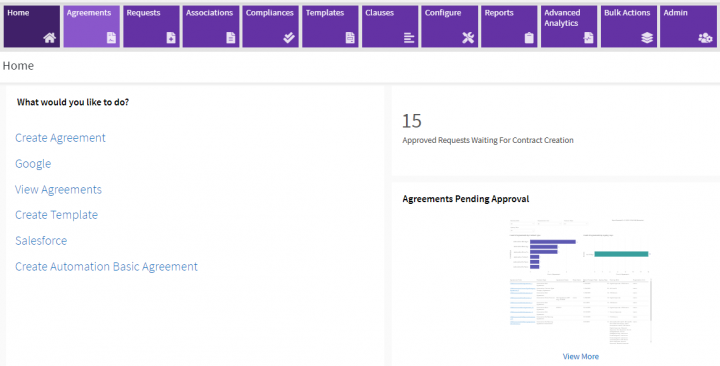
Now let’s consider an example of searching Agreements with the "PrimaryOwner" role using the "Team Member: Role Name" category.
2. Enter a category or select one from the "Categories" drop-down. For example, "Team Member: Role Name".
3. Select the Role(s) for which you want to view the Agreements. For example, "PrimaryOwner". All Agreements logged on with user as "PrimaryOwner" are displayed.
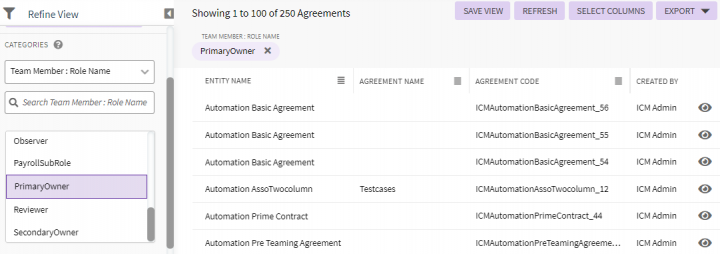
4. Let’s refine our search, select categories like "Team Member: User Name" (for example, "ICM Admin") from the "Categories" drop-down.
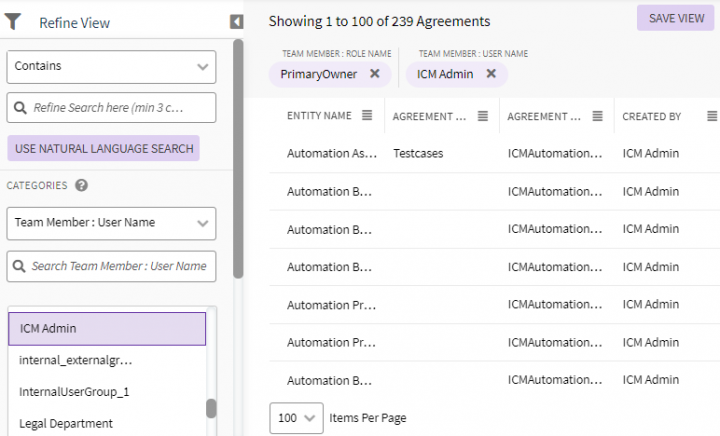
5. To further refine our search, select additional categories such as "Status" (for example, "Status: Waiting For Approval") from the Categories drop-down.
All Agreements where Team role is "PrimaryOwner", "User Name" is "ICM Admin", and "Status" is "Waiting For Approval" are displayed as shown in the screenshot below.
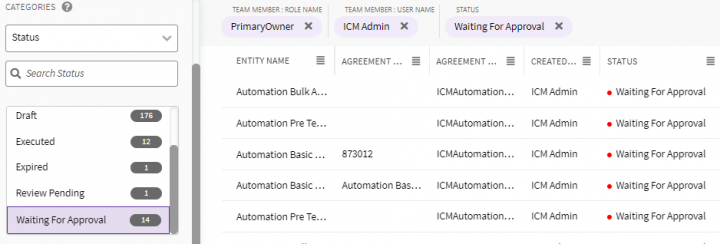
Saved Search
Follow these steps to use your saved searches:
1. Click "Agreements"on the "Home" page. The agreement index page opens, which displays all the existing agreements.
2. Click the Saved Searches "More Views" drop down and select the desired saved search. Refer to "Using Advanced Search" for details on saving a search. The agreements that match your search criteria are displayed.
Refer to "Saved Searches" for details on saving a search.
Index Page Search
Search functionality includes a drop-down of operators in the "Custom Keyword" box below the Refine View search. The operators include:
- Contains
- Exactly
- Starts With
This is applicable to the following data types – Auto, Email, String and User.
To perform a Search using the "Custom Keyword" dropdown:
1. Select the Entity to search.
2.Select any one operator to search by from the Custom Keyword dropdown list. You must enter a minimum of 3 characters to search by. On searching using just one or two characters, ICI displays a validation message prompting you to enter at least 3 characters. These fields are case-insensitive, hence characters can be entered in upper and/or lower case.
The following operators are available:
- "Contains" - displays all Agreements where the selected Attribute facet value contains the entered value anywhere in the Attribute value. The functionality is the same as the existing one and you can perform a search using * or any other wildcard search characters as well as the "AND", "OR" operators manually. The default behavior among the entered words will remain as "AND".
- "Exactly" - displays all the Agreements where the selected Attribute facet value exactly contains the entered value anywhere in the Attribute value. If you enter a string (multiple words), ICI considers the exact string including the spaces between these words.
- Starts With: displays all Agreements where the selected Attribute facet value starts with the entered value. If you enter a string (multiple words), ICI considers the exact string including the spaces entered between these words.
- Let’s see some examples:
- If you select "Customer name" as search facet, and enter "Icertis Canada" in the custom keyword box, then ICI searches Agreements where the customer name Attribute value starts with "Icertis Canada", such as, "Icertis Canada Products Ltd", "Icertis Canada Services Ltd", and so on. ICI does not display Agreements where customer name is "Icertis Europe Products Ltd", "Canada Interactive Ltd" or "Icertis Advanced Systems Canada Ltd".
- If you search "Icertis Can*", ICI does not display any results unless there is really an Agreement with a customer name starting with "Icertis Can*". Thus, ICI matches the exact entered value and checks if there is any Agreement where customer name starts with exactly the same value and will display only results that exactly match.
- If you search using quotes, such as “Icertis” or ‘Icertis’, ICI displays Agreements where the customer name actually has “Icertis” or ‘Icertis’ values respectively. Thus, ICI does not display any results, unless there is really any Agreement where the customer name was entered with single or double quotes.
Searches pinned as Favorites
Follow these steps to search using a favorite search:
1. Click "Agreements" on the "Home" page. The agreement index page opens which displays all the existing Agreements.
2. Click one of the searches defined as favorite, just below the feature tiles. Refer to "Using Advanced Search" for details on adding searches as favorites. The Agreements that match the criteria in your favorite search are displayed.
Related Topics: Advanced Search | Saved Searches | Agreements | Requests



